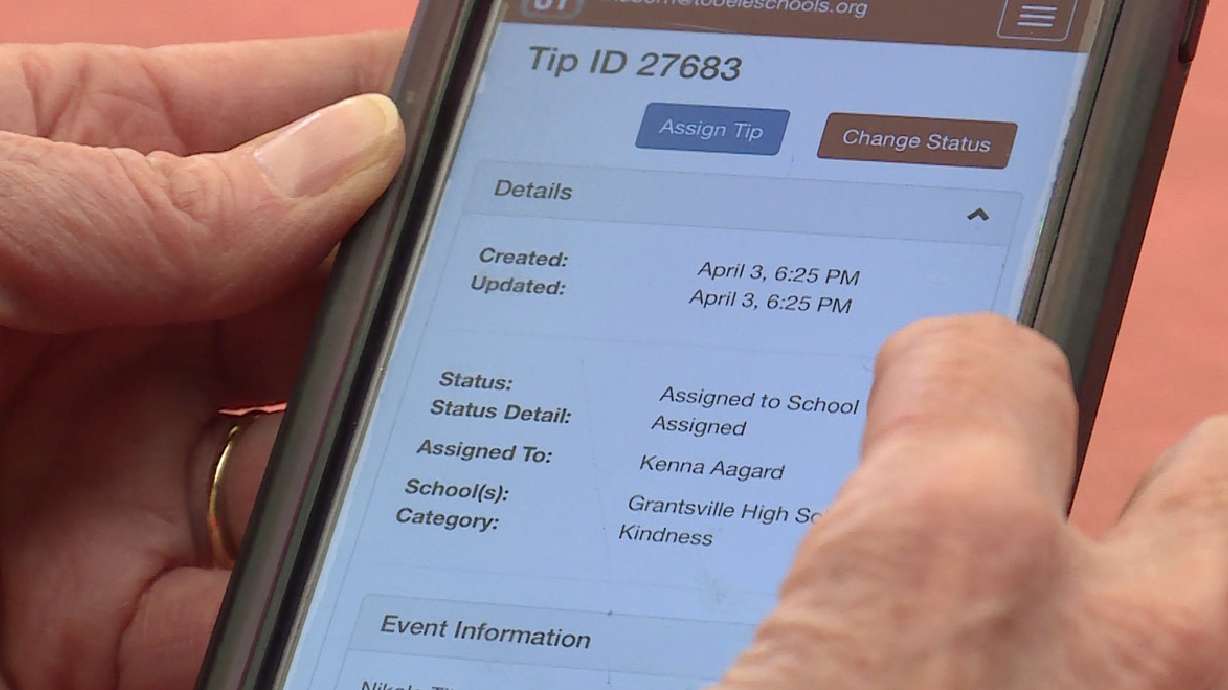Estimated read time: 3-4 minutes
This archived news story is available only for your personal, non-commercial use. Information in the story may be outdated or superseded by additional information. Reading or replaying the story in its archived form does not constitute a republication of the story.
SALT LAKE CITY — Utah students seeking help for their peers through a statewide crisis app last year cited risk of suicide more than any other reason.
More than one in five tips to the SafeUT app — 21%— stemmed from concern about others taking their own lives as the pandemic ratcheted up stress, according to the program's yearly report released Monday. The share is more than double that of tips tied to bullying, the second most common reason, at 9%, followed by depression, at 8%, in the year leading up to June 30.
"That's really one of the biggest trends that we saw in the last year," said Rachel Lucyinski with the University of Utah's Huntsman Mental Health Institute, which provides the program's counselors. "We just want to make sure that members of our community know that SafeUT is a really wonderful resource and place that people can turn for help and support."
Students in grade school through college can lodge concerns confidentially, as can parents and teachers, noted Lucyinski, the business operations manager for community crisis services at the institute.
Counselors are also on hand around the clock to respond to messages from those seeking help directly. In all, the app allowed them to work with first responders or school staff to intervene to save a person's life 298 times in the one-year period, a number that's in line with years past, Lucyinski said: The app typically helps save one life per day, and traffic is slower in the summer.
The state created the program in 2016 after suicide became the leading cause of death among children 10-17. SafeUT has since expanded to help those working in overburdened hospitals and emergency services in the COVID-19 pandemic.
It opened to front-line workers and first responders last year, with an infusion of $250,000 federal stimulus money, plus a matching financial boost from the state. It's also been available to members of the Utah National Guard since 2019.
More than 30,300 tips or text message conversations through the app came from students, their families and school employees, last year, while 83 trickled into the newer program geared toward those on the front line.
"It's pretty well known that folks in help-seeking professions usually have a hard time asking for help themselves: They feel like, I have to be the strong one and I have to be there to take care of people," Lucyinski said. She and her colleagues are trying to get out the word that they're ready to support the overwhelmed workers who have carried the state through the pandemic.
Utahns are becoming more comfortable seeking out help before they get to a point where they're in crisis, but stigma persists, Lucyinski said. So checking in with friends and loved ones can go a long way. Asking how someone is doing can make a person feel safe and doesn't raise the risk of suicide, she said.
SafeUT conversations with counselors in the pandemic tended to last longer in the pandemic than in years past, according to the report.
"I would say that's really one of the only silver linings for the pandemic," Lucyinski said. "It's started more conversations about mental health."
Those living in areas with higher poverty rates used the app more, suggesting that pandemic mental health effects were greater among those who already had economic stressors, the report states. But racial and ethnic disparities are evident. People in mostly white areas used the app much more than those in minority communities, Lucyinski said, so the institute is crafting its outreach efforts to address systemic racism and the challenges those communities may be facing.
Suicide Prevention Resources
If you or someone you know is struggling with thoughts of suicide, call the suicide prevention hotline at 1-800-273-TALK(8255) or Trevor Project hotline for LGBTQ teens: 1-866-488-7386.
Crisis Hotlines:
- National Suicide Prevention Lifeline: 1-800-273-TALK (8255)
- Statewide/Salt Lake County Crisis Line: 801-587-3000
- Utah County Crisis Line: 801-691-5433
- Wasatch Mental Health Crisis Line: 801-373-7393
- Trevor Project Hotline for LGBTQ teens: 1-866-488-7386
Online Resources:
- NAMI Utah: namiut.org
- County Crisis Lines: https://www.namiut.org/families-caregivers/suicide-prevention
- Utah Chapter-American Foundation for Suicide Prevention: afsputah.com
- Suicide Prevention Lifeline: www.suicidepreventionlifeline.org









